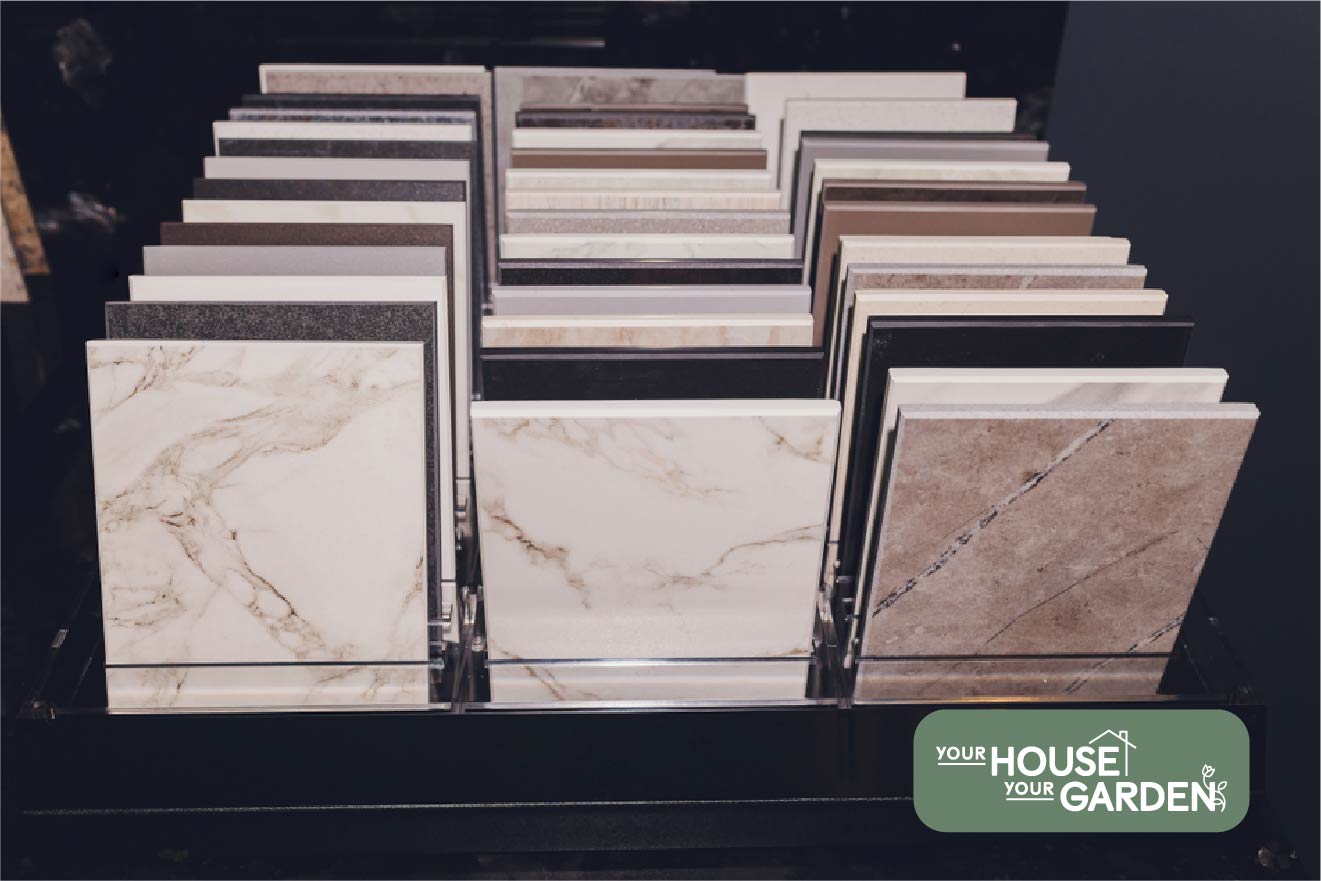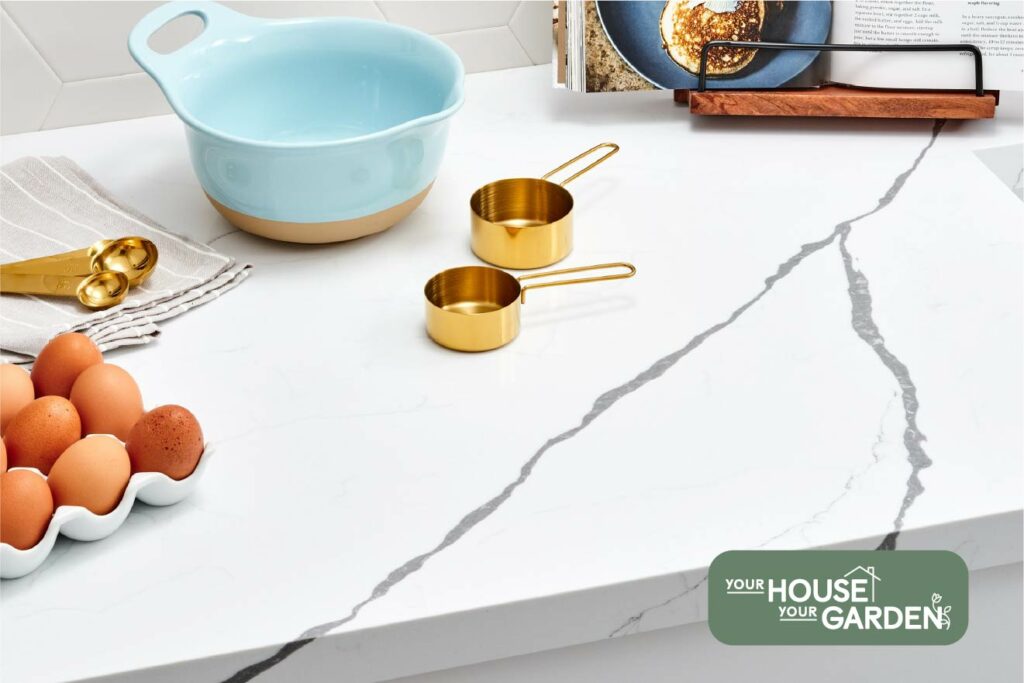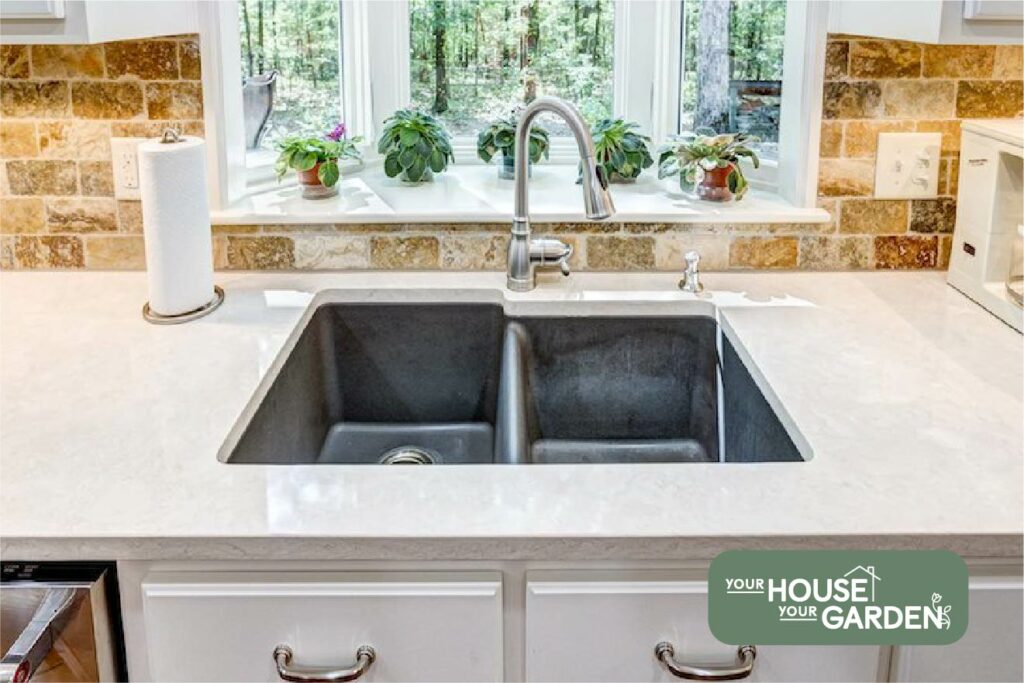Corian vs Marble Countertops
Home » Home Remodeling » Kitchen Countertops » Corian vs Marble Countertops
With so many different options for your countertop (e.g, laminate, quartz, granite, etc.) it is difficult to choose just one. However, if you’ve decided between marble or Corian, this is the guide for you. When one is choosing each element of a new kitchen or bathroom, it is good practice to really get to know your materials. Corian and marble are materials that are considered because the solid surface can be used to mimic marble. In order to better understand if real marble or Corian is a more affordable option than marble as well as if other natural materials are better for your counters, read on!
Corian vs Marble: The Difference
What is Corian?
Solid surface, also called Corian, was introduced in 1971 and debuted as the first engineered stone material that can be used as a countertop by DuPont. This solid surface material is used in kitchen and bathroom countertops because it is easily molded into slabs. Corian surfaces are composed of a natural mineral and polyester resin blend that is designed to look like natural stone. However, unlike natural stone countertops (e.g., granite countertops), a Corian countertop does not require sealing and is non-porous. Solid surface countertops may be more expensive than one made out of laminate but will definitely be more affordable than granite countertops or quartz countertops.
What is Marble?
Marble, a natural stone, is originally limestone that is subject to high temperatures and heat that is then quarried from the earth’s surface. Before becoming an expensive countertop material like other natural stones, soft limestone will undergo recrystallization, and calcite crystals interlock and form patterns that give this type of countertop surface its natural beauty. Similar to a granite countertop, a marble countertop is not naturally stain-resistant or scratch-resistant but will provide unique countertops just like other stones.

Pros and Cons
When choosing between the two, marble vs. a solid surface countertop, here are the different advantages and disadvantages that should be taken into consideration:
Corian Countertops: Pros
Very Low Maintenance: Corian is non-porous which makes it easy to take care of. As engineered stone products, Corian slabs are known for their stain resistance. A Corian surface does not require any sealing and can easily be cleaned with soapy water.
Fairly Easy to Repair: In the case that your new countertops made out of solid surface materials are scorched or chipped, they can be repaired. Unlike a granite countertop, Corian can be sanded down so that the surface is as good as new.
Can be Manufactured into Unique Shapes: Unlike granite countertops, solid surface is very versatile countertop material. A Corian countertop can be manufactured to be curved or have its own unique shape.
Budget-friendly Compared to Other Countertop Options: Compared to granite surfaces and quartz countertops, Corian countertops are more affordable but offer a similar aesthetic.
Corian Countertops: Cons
Not Known for its Scratch Resistance: Unfortunately, Corian countertops can be scratched. Sharp objects can leave visible scratch marks when they come into contact with the counter.
Lower Value Compared to Other Materials: As this is a more affordable option for your bathroom or kitchen countertops, it does not have a high resale value. For homeowners going through a kitchen remodeling project to increase the value of their home, this may not be the best material to choose.
Not Completely Heat Resistant: While solid surface countertops can take on some heat, a hot pot or pan that is heated to a temperature higher than 212ºF (100ºC) will damage the countertop material.
Can Change Color: When window cleaners or bleach are used to clean a solid surface countertop, it can cause the Corian countertop to change color. Avoid strong chemicals to protect the solid surface from discoloration.
Marble Countertops: Pros
One of the Most Unique Countertop Materials: As a natural stone, each marble countertop is unique. This means that kitchen countertops or slabs used for bathroom vanities are one-of-a-kinds.
Known for its Heat Resistance: Unlike laminate and quartz countertops, marble can take on the heat from hot pots or hot pans without being extremely damaged.
Can Increase the Value of Your Home: Similar to other natural stone slabs like granite countertops, a marble countertop can make a home more expensive. Aside from being beautiful, marble is a countertop material that must be quarried and is only found in certain areas around the world.
Marble Countertops: Cons
Needs to Be Properly Sealed: Marble is one of the countertop materials that require sealing in order to be more stain-resistant. Just like a granite countertop, marble surfaces need to be sealed on a regular basis which may be too high maintenance for some homeowners.
One of the More Expensive Countertop Surfaces: Just like other natural stones that are made into a bathroom and kitchen countertops, marble costs more than laminate or Corian per square foot.
Not Highly Resistant to Acids: While marble is known for its heat resistance, this is a countertop material that is easily affected by acidic liquids like lemon juice. While this liquid will not stain marble, a marble slab will definitely etch.
May Have Visible Grout Lines: Marble countertops will have visible grout lines that are obvious due to each slab’s unique color and veining pattern. Unlike quartz countertops, marble does not have a uniform composition which may make it hard for some homeowners to mix and match slabs.
Will Require Professional Installation: Due to its composition, marble is naturally heavier than a laminate countertop for example. Marble is also an expensive material for surfaces which means that it requires professional care during installation. The extra cost of hiring professionals to install countertops made out of marble may be a drawback for some homeowners.
Comparing the Two
In order to choose between marble and Corian countertops, it is wise to look at the materials side by side.
Maintenance
Corian vs marble, solid surfaces are much easier to maintain. Even compared to cultured marble, Corian countertops are better in terms of stain resistance and repairs. Corian countertops are also non-porous throughout the entire slab and will not require regular sealing. In fact, Corian does not need sealing at all.
Value
Marble vs Corian in terms of value, marble without a doubt. Marble will cost $60 to $200 per square foot while Corian will cost $45 to $65 for a countertop of the same size. Marble is known for its unique composition which is then used to create incredibly beautiful countertops. On the other hand, Corian is manufactured to look like certain materials (e.g., quartz countertops and granite countertops) but at a fraction of the cost.
Seams
Looking at the aesthetic aspect of these materials, Corian vs marble, Corian offers homeowners a seamless countertop option. Due to its uniform composition, if Corian is manufactured to look like quartz countertops or granite countertops, the seams in between tiles or slabs are nearly invisible. Just like granite countertops, however, marble is a material that when made into countertops will have visible seams.
Durability
Both materials, marble and Corian, are durable in their own way. For instance, Corian is stain-resistant but marble is a surface resistant to heat. However, marble vs Corian in terms of lifespan, marble lasts longer. With proper countertop maintenance, Corian can last up to 10 years. Marble, on the other hand, can last up to 100 years with proper care.
Design
Marble vs solid surface, both are equally design-friendly. For homeowners whose interior design preference requires a countertop that is unique and stands out, marble is a great choice. Marble is a material that has a limited variety of colors and patterns but each countertop is simply breathtaking. On the other hand, Corian can offer versatility because of the different colors, patterns, and finishes it is available in. Additionally, Corian can be used to mimic quartz countertops. It is a material that can also be used to give a space a faux granite countertop.
Cost
Looking at their prices, marble vs solid surface, a Corian countertop will cost you significantly less. Not only is a solid surface more affordable, but it can also be installed as a DIY project. Not only are you paying more for the material itself, but marble requires professional installation as well.


FAQs: Corian Solid Surface vs Marble Countertops
Cultured marble vs Corian: what is the difference?
Both cultured marble and solid surface are materials made out of natural stone and polymer resins. However, Corian offers homeowners more variety than cultured marble. Compared to cultured marble, a solid surface has a more modern, refined appearance as well. Cultured marble is also more expensive because it is not as popular as a countertop surface.
Marble vs solid surface: can these materials be used as tiles?
Yes, both marble and Corian can be used as tiles in order to make up an entire countertop or as the kitchen backsplash.
Corian vs marble vs granite countertops
All of these materials are popular countertop options but each has its own charm which is why one may choose a certain material over the other. A homeowner may choose granite because it is low-maintenance, valuable, repairable, elegant, and sustainable.
However, Corian vs granite, one may choose a solid surface counter instead because it is more affordable compared to the igneous rock but can be manufactured to mimic granite. On the other hand, choosing between the different natural stones may be a little harder. Marble vs granite, marble is more valuable but a damaged granite tile or slab is easily repairable.
Ultimately, the decision between these materials depends on your budget, interior design style, and how much maintenance you are willing to do.
